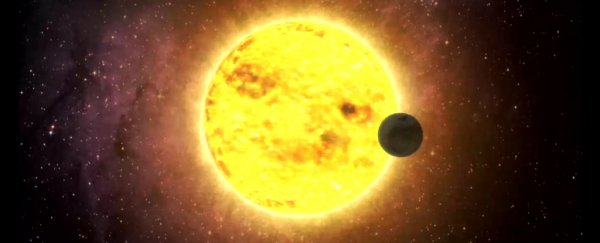Update: The announcement has been made - NASA has discovered seven Earth-sized planets orbiting a star 39 light-years away! Read more about it here.
By now, you're probably as excited as we are about NASA's big "beyond our Solar System" discovery that's being announced in a live press conference in a few hours.
We're so excited, we're going to be live blogging the exoplanet announcement as it happens, so you guys will be first to hear the news. And we've embedded the NASA TV live stream below, so we can all witness the potentially history-making announcement together.
The live stream begins on NASA TV (which is streaming below) at 1pm ET on Wednesday, 22 February (5am AEST on Thursday, 23 February):

So, what do we know so far?
Well, we're going to put it out there now that the announcement probably isn't about aliens, but it is something related to exoplanets - that is, planets beyond our Solar System.
We find new exoplanets all the time, but seeing as NASA is making such a big deal about this one, we can assume that whatever they've found outside our Solar System could potentially host life.
The last time an exoplanet announcement got this much hype was when the European Space Organisation confirmed the discovery of Proxima Centauri b - better known as Proxima b - an Earth-like planet in our closest neighbouring star system, Alpha Centauri.
Unfortunately, the habitability of Proxima b has since had some heavy doubt cast on it. But the fact that the planet is so close - relatively speaking - that we could visit it in the next 50 years means it's still an exciting target for future missions.
And this latest NASA announcement could offer up something even more lucrative.
All NASA has said so far is that the press conference will "present new findings on planets that orbit stars other than our Sun, known as exoplanets".
Details of the finding will also be published in Nature, and simultaneously released at 1pm ET.
The public can ask questions during the briefing on Twitter using the #askNASA hashtag.
And at 3pm ET, 2 hours after the briefing commences, the participants will be holding a Reddit Ask Me Anything in English and Spanish - so start thinking of questions now!
The briefing participants are:
- Thomas Zurbuchen, associate administrator of the Science Mission Directorate at NASA Headquarters in Washington
- Michael Gillon, astronomer at the University of Liege in Belgium
- Sean Carey, manager of NASA's Spitzer Science Centre at Caltech/IPAC, Pasadena, California
- Nikole Lewis, astronomer at the Space Telescope Science Institute in Baltimore
- Sara Seager, professor of planetary science and physics at Massachusetts Institute of Technology, Cambridge.
That line-up doesn't tell us a huge amount, but the fact that there's no astrobiologist involved makes us suspect that the announcement will focus more on new exoplanets and their composition, rather than going into too much detail on their potential habitability at this stage.
But that's all speculation for now. Stay tuned, and we'll see you back here in a few short hours to learn something new together.
